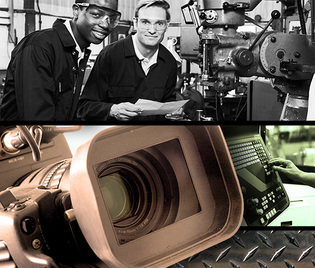Today manufacturing operations are innovative masterpieces. Engineers and machinists are working together to make manufacturing shops clean, well-lighted environments brimming with advances in modern tooling and design. These advances include…CNC machining technology…3D printing…computer assisted design and the video camera…The VIDEO CAMERA?
… Yes, the video camera! More specifically “video communications.” While it will never be confused with a 5-axis milling machine or an injection molding machine video is a tool that holds its own in regard to adding value within a manufacturing operation. It is a communications tool that is primed to deliver key messages to staff and customers alike. Below are three areas where I have found video communications to be beneficial in relation to manufacturing.
Training
If you have staff, you have a need for training and continuous improvement. That training is likely best handled through “hands-on” instruction. When such instruction is not possible for reasons including limited availability of training staff an effective alternative is video based training. Video based training can be used as a self-serve resource that can be shared online or through a company intranet or even DVDs. Such a resource can be used for primary training or when workers need a refresher on a process.
Innovation
As impressive and as cool as your manufacturing operation is, who knows about it outside of your company? A brief customer facing video highlighting how your innovations make for a better product may serve as a big advantage over competitors! When customers visit your website, reward them with a peek into the innovations you have put in place to benefit them!
Safety
From machine safety to fire and alarm safety there are crucial messages that must be communicated to every worker in the shop or office. Creating a safety video can be an easy and effective way to educate staff on proper procedures related to their well-being. Videos of this type can be used when on-boarding new workers or when new policies are developed. Such videos can also help support state and federal government safety regulations.
If your organization is interested in communicating through video, I encourage you to touch base with a professional for initial guidance on leveraging this powerful resource. With a video camera, editing equipment and knowledge, video communications may become the most versatile tool in your operation next to that automated 5-axis mill!
… Yes, the video camera! More specifically “video communications.” While it will never be confused with a 5-axis milling machine or an injection molding machine video is a tool that holds its own in regard to adding value within a manufacturing operation. It is a communications tool that is primed to deliver key messages to staff and customers alike. Below are three areas where I have found video communications to be beneficial in relation to manufacturing.
Training
If you have staff, you have a need for training and continuous improvement. That training is likely best handled through “hands-on” instruction. When such instruction is not possible for reasons including limited availability of training staff an effective alternative is video based training. Video based training can be used as a self-serve resource that can be shared online or through a company intranet or even DVDs. Such a resource can be used for primary training or when workers need a refresher on a process.
Innovation
As impressive and as cool as your manufacturing operation is, who knows about it outside of your company? A brief customer facing video highlighting how your innovations make for a better product may serve as a big advantage over competitors! When customers visit your website, reward them with a peek into the innovations you have put in place to benefit them!
Safety
From machine safety to fire and alarm safety there are crucial messages that must be communicated to every worker in the shop or office. Creating a safety video can be an easy and effective way to educate staff on proper procedures related to their well-being. Videos of this type can be used when on-boarding new workers or when new policies are developed. Such videos can also help support state and federal government safety regulations.
If your organization is interested in communicating through video, I encourage you to touch base with a professional for initial guidance on leveraging this powerful resource. With a video camera, editing equipment and knowledge, video communications may become the most versatile tool in your operation next to that automated 5-axis mill!

 RSS Feed
RSS Feed
